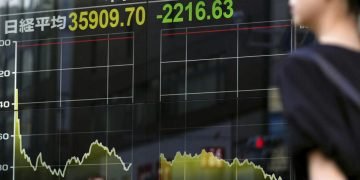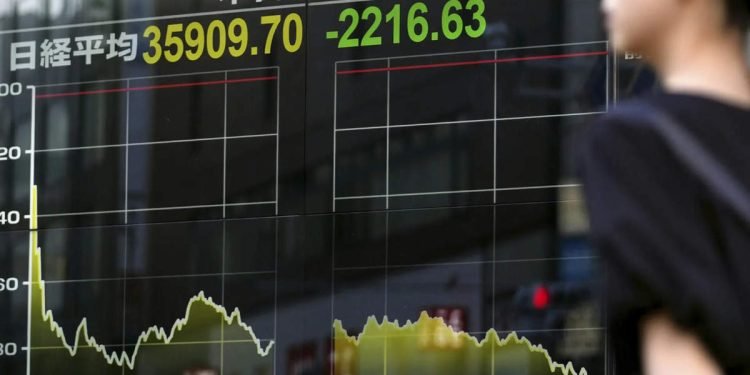After a period of significant volatility and widespread sell-offs in global markets, Asian markets have rebounded with solid gains, signaling renewed investor confidence in the region’s economic resilience. The turnaround comes after a series of challenging weeks where concerns over inflation, rising interest rates, and geopolitical tensions had caused sharp declines across major stock indices worldwide.
Rebounding from a Global Sell-Off
The recent gains in Asian markets follow a global rout that saw equity markets in the United States, Europe, and other regions experiencing significant losses. The sell-off was driven by fears of tightening monetary policy from central banks, especially the U.S. Federal Reserve, as well as uncertainties surrounding the ongoing conflicts in Europe and Asia. These factors had contributed to a risk-off sentiment, leading to broad-based declines across sectors.
However, Asian markets have shown remarkable resilience in the face of these global headwinds. Major indices across the region, including Japan’s Nikkei 225, Hong Kong’s Hang Seng, and South Korea’s KOSPI, posted solid gains, buoyed by positive economic data, corporate earnings, and renewed investor sentiment.
Drivers of the Rebound
Several factors have contributed to the recent upturn in Asian markets:
- Positive Economic Data: Key economic indicators from major Asian economies have shown signs of stability and growth, providing reassurance to investors. For instance, China’s latest manufacturing and export data exceeded expectations, suggesting that the world’s second-largest economy is maintaining momentum despite global challenges. Similarly, Japan’s economic outlook has been bolstered by strong corporate earnings and government stimulus measures aimed at revitalizing domestic consumption.
- Central Bank Support: Central banks across Asia have been taking a cautious approach to monetary tightening, with several opting to maintain accommodative policies to support growth. The Bank of Japan, for instance, has continued its ultra-loose monetary policy, helping to stabilize markets. Additionally, the People’s Bank of China has implemented targeted measures to ensure liquidity and support key sectors, contributing to the market’s positive performance.
- Corporate Earnings: Strong corporate earnings reports from major Asian companies have also played a role in boosting investor confidence. Tech giants, manufacturers, and financial institutions across the region have posted better-than-expected results, underscoring the resilience of Asia’s corporate sector amid global uncertainty.
- Geopolitical Stability: While geopolitical risks remain, particularly in regions like Taiwan and the South China Sea, recent diplomatic efforts and a lack of escalation have provided some relief to markets. Investors have also been encouraged by signs of thawing trade tensions between major economies, which could pave the way for more stable global trade relations.
Market Performance Across the Region
- Japan’s Nikkei 225: The Nikkei 225 led the charge with a significant uptick, driven by strong corporate earnings, particularly in the tech and manufacturing sectors. The index benefited from a weaker yen, which boosts the competitiveness of Japan’s exports, and continued support from the Bank of Japan’s monetary policy.
- Hong Kong’s Hang Seng: The Hang Seng Index also recorded solid gains, supported by a rebound in Chinese tech stocks and positive economic signals from mainland China. Investor sentiment was further lifted by hopes of a more favorable regulatory environment for Chinese companies listed in Hong Kong.
- South Korea’s KOSPI: South Korea’s KOSPI index showed strength, particularly in its technology sector, which has been buoyed by global demand for semiconductors and electronics. The South Korean government’s initiatives to support innovation and exports have also contributed to the market’s recovery.
- China’s Shanghai Composite: The Shanghai Composite Index saw moderate gains, reflecting a cautious optimism among investors. The market has been supported by government policies aimed at stabilizing growth and ensuring liquidity in key sectors, though concerns about property market risks and regulatory crackdowns continue to weigh on sentiment.
Looking Ahead
While the recent gains in Asian markets are encouraging, analysts caution that volatility could persist as global uncertainties remain. The trajectory of inflation, the pace of interest rate hikes by central banks, and geopolitical developments will continue to be closely watched by investors. However, the resilience demonstrated by Asian markets suggests that the region is well-positioned to navigate the challenges ahead, supported by strong economic fundamentals and proactive policy measures.
Investors will be closely monitoring upcoming economic data releases, corporate earnings reports, and central bank meetings for further signals on the market’s direction. For now, the solid gains across Asian markets reflect a cautious optimism that, despite the global rout, the region’s economic growth story remains intact.























